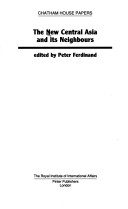Chatham House Papers
1 total work
In Central Asia, hope and anxiety have alternated since the collapse of the Soviet Union. On the one hand the peoples of Central Asia are now closer to being masters of their destiny than at any time this century. On the other hand the civil war in Tajikistan is a constant reminder of the fragility of ethnic relations in the region as a whole. Meanwhile other states, especially neighbouring ones, look on nervously. This study focuses both on developments inside the five republics of former Soviet Central Asia - Kyrgyzstan, Tajikistan, Turkmenistan, Uzbekistan and Kazakhstan - and on their relations with neighbouring states. It starts by examining the republics' history and the extent to which they had a Central Asian identity in the past and are trying to create one now.
Further chapters deal with relations with Russia, including the official policies of the republics, and popular attitudes towards their Russian minorities; relations with the Middle East, in particular Iran and Turkey; the impact on South Asia, especially on Indo-Pakistani relations over Kashmir, and on Afghanistan; and China, in particular the effect of the changes in Central Asia on Xinjiang, and upon Beijing's plans for the exploitation of oil in the republics.
Further chapters deal with relations with Russia, including the official policies of the republics, and popular attitudes towards their Russian minorities; relations with the Middle East, in particular Iran and Turkey; the impact on South Asia, especially on Indo-Pakistani relations over Kashmir, and on Afghanistan; and China, in particular the effect of the changes in Central Asia on Xinjiang, and upon Beijing's plans for the exploitation of oil in the republics.
